What Information Is Included in a Police Background Check?
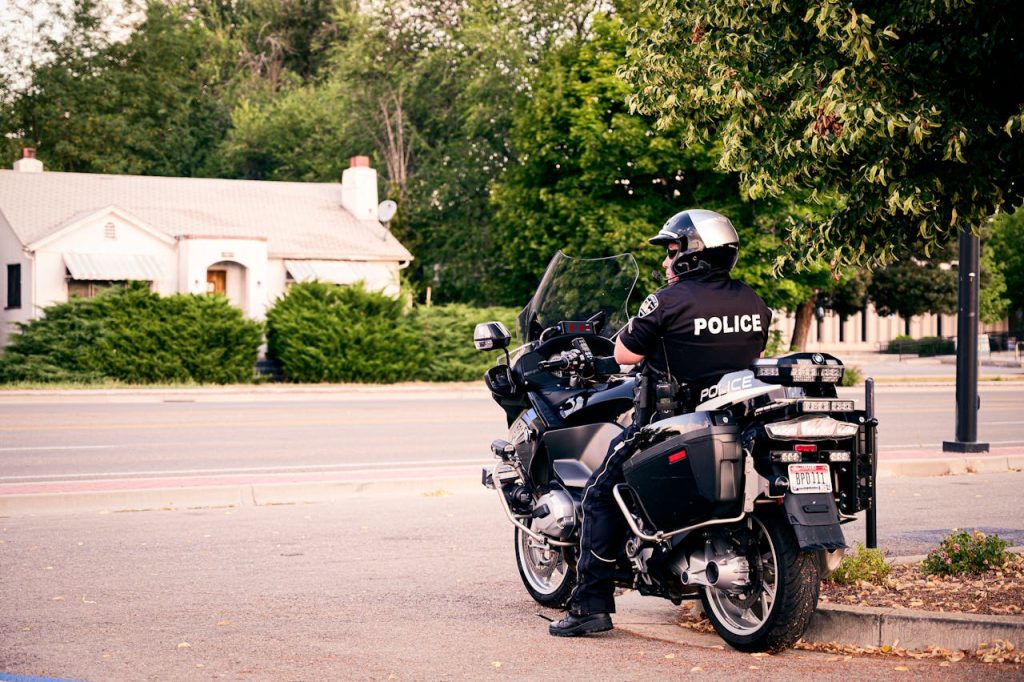
Introduction to Police Background Checks
A police background check is a detailed report that provides information about an individual’s criminal history and other relevant legal matters. These checks are typically conducted by law enforcement agencies at various levels, such as local, state, and federal authorities, to determine whether an individual has any prior criminal activity or legal issues that could pose a risk in certain situations. The primary purpose of a police background check is to ensure safety, protect the integrity of hiring processes, and confirm that individuals meet legal requirements for specific roles or privileges.
Types of Police Background Checks
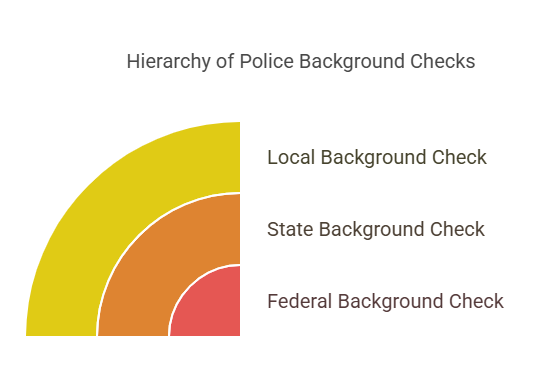
There are different types of police background checks, each focusing on various aspects of an individual’s criminal and legal history. Here’s an overview of the most common types:
1. Local Police Background Check
A local police background check is conducted by municipal or county law enforcement agencies. It primarily involves checking criminal records within the specific jurisdiction, including any arrests, convictions, or active warrants in that area. Local checks are often used for routine employment screening, security clearances, and landlord checks.
2. State Police Background Check
A state police background check involves reviewing criminal records within the boundaries of a specific state. This check typically includes offenses that occurred within that state’s jurisdiction, including arrests, charges, convictions, and sex offender registration. State background checks are often used for jobs that require state licenses, such as teachers, healthcare professionals, or public service workers.
3. Federal Police Background Check
A federal police background check is the most comprehensive type, focusing on criminal activity that violates federal law, such as drug trafficking, federal fraud, and interstate offenses. The Federal Bureau of Investigation (FBI) typically handles these checks, which are often required for jobs that involve sensitive or high-security information, such as federal employment or defense contracting.
Who Needs a Police Background Check?
Police background checks are required by various individuals, organizations, and agencies for several reasons, including employment, safety, and legal compliance. Below are the most common parties that require a police background check:
1. Employers
Employers frequently request police background checks to ensure potential employees do not have a criminal history that could impact their job performance, public safety, or company reputation. Police background checks are commonly used in hiring processes, especially for positions involving direct customer interaction, access to confidential information, or roles in industries like healthcare, finance, and security.
2. Individuals
Individuals may need a police background check for a variety of personal reasons, such as applying for a visa, adopting a child, or obtaining a firearm license. Certain personal activities, like renting a home, may also require individuals to submit to background checks to satisfy legal requirements.
3. Government Agencies
Government agencies at the local, state, and federal levels often perform background checks for employment purposes, particularly for positions that require access to sensitive information or security clearance. Law enforcement and intelligence agencies also conduct background checks for security reasons.
How Police Background Checks Differ from Other Types of Background Checks
Although similar in nature, police background checks differ significantly from other types of checks, such as employment background checks or credit checks.
Police Background Checks vs. Employment Background Checks
- Purpose: Police background checks focus specifically on criminal history, including arrests, convictions, and warrants, while employment background checks may encompass a broader range of information, including employment history, education verification, and references.
- Scope: Police background checks are typically more focused on an individual’s legal and criminal history, while employment checks may look into a variety of aspects to assess overall suitability for a job.
- Authorization: A police background check is often initiated by law enforcement agencies, while employment background checks are typically performed by third-party agencies at the request of an employer.
Police Background Checks vs. Credit Checks
- Purpose: A credit check focuses on an individual’s financial history, including outstanding debts, payment history, and credit score, which can be used by employers in certain industries to evaluate financial responsibility. On the other hand, a police background check provides insights into an individual’s criminal history, such as arrests, convictions, and charges.
- Scope: Credit checks are more concerned with financial matters, while police checks focus on legal issues and criminal activity.
- Usage: Credit checks are commonly required for positions that involve managing finances, such as roles in banking or accounting, while police checks are required for safety-sensitive positions, such as security jobs or law enforcement.
Overview of the Police Background Check Process
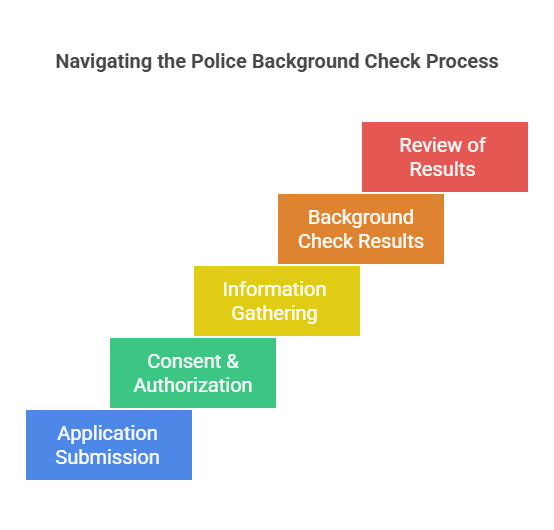
The police background check process can vary depending on the jurisdiction and purpose of the check. However, the general steps typically include the following:
- Application Submission: The first step in obtaining a police background check is to submit a request. This may require filling out forms, providing identification, and paying any necessary fees.
- Consent and Authorization: In most cases, the individual undergoing the background check must provide consent for the process. Employers or organizations may request this consent before initiating the background check.
- Information Gathering: The police agency will gather relevant information, such as fingerprints, identification, and other personal details, to conduct the check. This may involve searching local, state, and federal databases.
- Background Check Results: Once the check is complete, the results will be made available to the requesting party, such as an employer or government agency. The report may include details about arrests, convictions, warrants, or any other legal issues.
- Review of Results: Depending on the purpose of the check, the results will be reviewed. In the case of employment, the results may be used to make a hiring decision.
Step-by-Step Process of Obtaining a Police Background Check
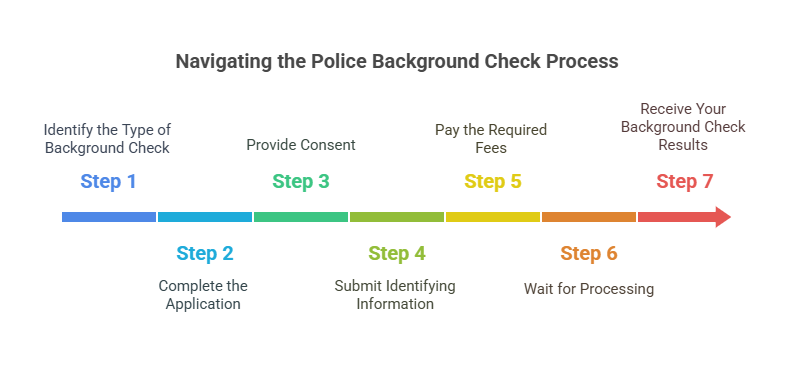
Obtaining a police background check is a straightforward process, but it requires attention to detail and proper documentation. Below is a detailed step-by-step guide to help you understand the process:
1. Identify the Type of Background Check You Need
The first step in obtaining a police background check is identifying which type of check is required. This can be a local, state, or federal background check, depending on your needs.
- Local Background Check: This type of check is typically done at the city or county level and will focus on criminal records within that specific jurisdiction.
- State Background Check: A state check looks into criminal history across the state’s jurisdiction. This includes felonies, misdemeanors, and other offenses that have been recorded in state databases.
- Federal Background Check: A federal check is performed for offenses that involve federal law and is typically processed by the FBI. This is often required for high-security positions or when dealing with federal agencies.
2. Complete the Application
After determining the type of background check you need, the next step is to complete the required application form. The form may ask for personal details, such as your full name, address, social security number, and date of birth.
- Local Police: You may need to visit the police department or the sheriff’s office to fill out the application.
- State Police: Typically, state police have an online platform where you can apply for a background check.
- Federal Police: For a federal background check, you may need to go through the FBI or a third-party screening agency authorized by the FBI.
3. Provide Consent
For any police background check, you must give consent for the law enforcement agency to conduct the check. This consent may be required in writing or electronically.
- Employer or Organization Consent: In many cases, an employer or organization may request that you provide written consent for the background check to be initiated. Employers often require this for job screening purposes.
- Personal Consent: If you’re requesting the background check for personal reasons, you’ll need to sign a consent form to authorize the agency to release your criminal history or other records.
4. Submit Identifying Information
Once you’ve completed the application, you will need to provide identifying information to help the police or relevant agency conduct the check. This typically includes:
- Full Name: Your legal name as listed on identification documents.
- Date of Birth: This is crucial for differentiating between individuals with similar names.
- Social Security Number (if applicable): This helps confirm your identity and matches your criminal records.
- Fingerprints: Some background checks, especially those conducted by the FBI, require fingerprinting. This can usually be done at a local law enforcement agency or through a designated service provider.
5. Pay the Required Fees
Depending on the type of police background check you’re requesting, there may be a fee. These fees are usually minimal but can vary depending on the jurisdiction.
- Local Police: Fees for local checks are often low or may even be waived for certain individuals.
- State Police: State-level checks typically have a standard fee, which can be paid online or in person.
- Federal Police: Federal background checks often involve higher fees, especially if you require more detailed information or expedited processing.
6. Wait for Processing
Once you’ve submitted your application, consent, and payment, the law enforcement agency will begin processing your background check request. The amount of time it takes can vary depending on the jurisdiction and type of check.
- Local Police Checks: These typically take a few days to a week to complete.
- State Police Checks: State checks may take up to two weeks, depending on the state and the volume of requests.
- Federal Police Checks: Federal checks, especially those done by the FBI, can take several weeks to months, depending on the complexity of the search.
7. Receive Your Background Check Results
Once the background check is complete, you will receive the results in one of several formats:
- Online Access: Some jurisdictions provide an online portal where you can view your results immediately after they’ve been processed.
- Mail: In some cases, you will receive a physical report of your background check through the mail.
- Employer or Organization Access: If the check was done for an employer or organization, they may receive the results directly, and you will be informed of the outcome.
Requirements for Requesting a Police Background Check
The specific requirements for requesting a police background check will vary depending on the jurisdiction and the type of check. However, the following are common documents and criteria typically needed:
1. Personal Identification
You will need to provide valid identification to verify your identity. Acceptable forms of ID typically include:
- Driver’s License
- Passport
- State-issued ID card
- Social Security Number (if applicable)
2. Consent Forms
You will need to sign a consent form, especially if the background check is being requested by an employer or third-party organization. This form gives the requesting party permission to access your criminal records.
3. Fingerprints (if required)
For certain checks, particularly federal checks or those requiring in-depth investigations, fingerprints will be needed. You can typically get fingerprinted at a local law enforcement agency or designated service provider.
4. Payment
Most police background checks require payment of a fee. This can usually be paid online, by check, or in person, depending on the agency.
Common Disqualifications Based on Police Background Check Results
When a police background check is conducted, there are several factors that may lead to disqualification for a job, housing, or other opportunities. Common disqualifications include:
1. Criminal Convictions
- Felonies: Felony convictions can result in automatic disqualification, particularly for positions involving trust, security, or financial responsibility.
- Misdemeanors: Serious misdemeanors, such as theft or violent crimes, can also lead to disqualification.
- Pending Charges: Even if someone is not convicted, pending charges can impact their eligibility.
2. Arrests
- Recent Arrests: Even if charges were dropped or a person was not convicted, a recent arrest may be a red flag for employers or landlords.
- Warrants: An active warrant for an individual’s arrest is a serious disqualification for most roles.
3. Lack of Accurate Documentation
If the background check results are incomplete or contain errors due to incorrect or missing documentation, this can delay or prevent further action.
Our Services: Exact Background Checks
At Exact Background Checks, we provide professional, accurate, and timely police background check services. Whether you’re an employer, legal professional, or individual looking for a thorough check, we ensure compliance with all legal regulations and provide reliable results.
Why Choose Exact Background Checks?
- Accuracy: We deliver precise and up-to-date background checks, ensuring that all necessary information is included.
- Compliant with Laws: We adhere to all legal requirements, including compliance with the Fair Credit Reporting Act (FCRA) and local/state laws.
- Efficient Process: Our streamlined process allows us to deliver results promptly, even for complex cases.
Summary of Key Steps for Police Background Check:
| Step | Details |
|---|---|
| 1. Identify Check Type | Local, state, or federal background check based on need. |
| 2. Complete Application | Fill out required forms and provide personal information. |
| 3. Provide Consent | Sign consent forms for background check processing. |
| 4. Submit Identification | Provide necessary identification documents such as a driver’s license. |
| 5. Pay Fees | Submit payment for the background check, which may vary based on jurisdiction. |
| 6. Wait for Processing | Background check processing times vary based on the type and jurisdiction. |
| 7. Receive Results | Receive your results online, by mail, or through the requesting organization. |
Legal Aspects of Police Background Checks
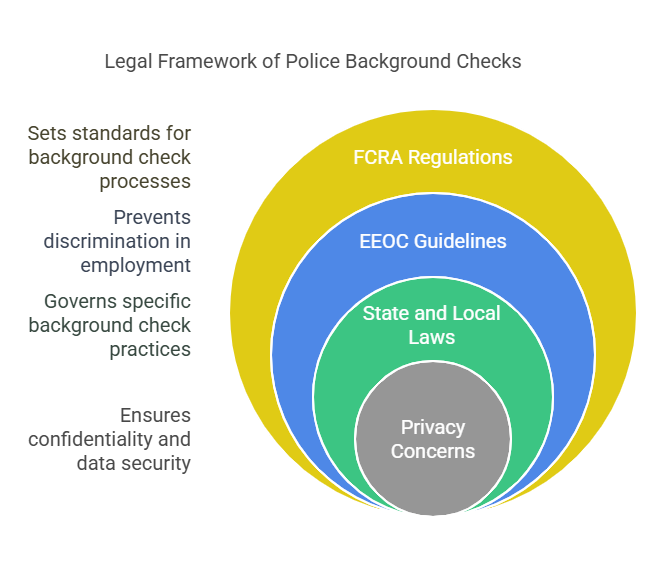
Police background checks are governed by several legal frameworks to ensure fairness, transparency, and protection of individual rights. These laws apply to how background checks are conducted, the information that can be accessed, and how that information is used. Understanding these regulations is crucial for both individuals requesting background checks and organizations conducting them.
1. Fair Credit Reporting Act (FCRA)
The Fair Credit Reporting Act (FCRA) is a key federal law that governs how background checks are conducted and used, particularly when the results are used for employment, credit, or housing decisions. The FCRA applies to third-party organizations, such as background screening agencies, that collect and report information about individuals.
- Consent: Under the FCRA, any organization that conducts a background check for employment or other purposes must obtain written consent from the individual being checked.
- Accuracy: The law mandates that background check providers maintain accurate and up-to-date information. If there are errors in a report, individuals have the right to dispute and correct them.
- Disclosure: If an adverse decision (such as denial of employment or housing) is made based on background check results, the organization must inform the individual and provide them with a copy of the report.
2. Equal Employment Opportunity Commission (EEOC)
The Equal Employment Opportunity Commission (EEOC) enforces federal laws that prohibit discrimination in the workplace. When conducting police background checks for employment, the EEOC’s guidelines ensure that employers do not use criminal history information in a way that discriminates against individuals based on race, color, national origin, sex, disability, or religion.
- Ban the Box: Many states and cities have passed “Ban the Box” laws, which prevent employers from asking about criminal history on job applications. These laws are designed to give candidates a fair opportunity to be considered for a job before their criminal history is scrutinized.
- Criminal History Considerations: The EEOC advises employers to evaluate criminal history on a case-by-case basis, considering the nature of the offense, the time passed, and its relevance to the job position.
3. State and Local Laws
In addition to federal laws, many states and local jurisdictions have specific laws governing the use of police background checks. These laws may vary, particularly when it comes to the types of offenses that can be disclosed or considered for employment, housing, or other purposes.
- Expunged or Sealed Records: In some states, individuals with expunged or sealed criminal records may not have to disclose those records during a background check. It is important to understand the laws in your jurisdiction regarding the disclosure of such records.
- State-Specific Regulations: Some states have their own rules for how background checks are conducted, including which types of offenses can be included or excluded from reports.
4. Privacy Concerns
The information accessed during a police background check is private and should only be used for its intended purpose. Inappropriate sharing or misuse of background check information can lead to privacy violations, legal action, and reputational damage.
- Confidentiality: Employers, landlords, and other entities must ensure that background check information is handled confidentially and not shared without proper consent.
- Data Security: With the rise of digital background checks, ensuring the security of personal data is paramount. Companies conducting background checks must follow strict protocols to protect this sensitive information from breaches.
Frequently Asked Questions (FAQs)
What are the main types of police background checks, and how do they differ?
- The main types are local, state, and federal. Local checks cover criminal records within a specific city or county. State checks review records within a state's jurisdiction. Federal checks, conducted by the FBI, focus on federal law violations and are the most comprehensive.
Who typically requires police background checks, and why?
- Employers often require them for hiring, especially for sensitive positions. Individuals may need them for visas, adoptions, or firearm licenses. Government agencies use them for employment and security clearances. The purpose is to ensure safety, protect integrity, and meet legal requirements.
How do police background checks differ from employment background checks and credit checks?
- Police background checks focus specifically on criminal history. Employment background checks are broader, including employment and education verification. Credit checks focus on financial history. Police checks are typically conducted by law enforcement, while the others are often done by third-party agencies.
What are the general steps involved in obtaining a police background check?
- The process includes submitting an application, providing consent, gathering information (including fingerprints if required), paying fees, waiting for processing, and receiving the results.
What legal aspects govern police background checks?
- Police background checks are governed by the Fair Credit Reporting Act (FCRA), which ensures consent and accuracy; Equal Employment Opportunity Commission (EEOC) guidelines, which prevent discrimination; state and local laws, which vary by jurisdiction; and privacy concerns, which mandate confidentiality and data security.
What are the main types of police background checks, and how do they differ?
- The main types are local, state, and federal. Local checks cover criminal records within a specific city or county. State checks review records within a state's jurisdiction. Federal checks, conducted by the FBI, focus on federal law violations and are the most comprehensive.
Who typically requires police background checks, and why?
- Employers often require them for hiring, especially for sensitive positions. Individuals may need them for visas, adoptions, or firearm licenses. Government agencies use them for employment and security clearances. The purpose is to ensure safety, protect integrity, and meet legal requirements.
How do police background checks differ from employment background checks and credit checks?
- Police background checks focus specifically on criminal history. Employment background checks are broader, including employment and education verification. Credit checks focus on financial history. Police checks are typically conducted by law enforcement, while the others are often done by third-party agencies.
What are the general steps involved in obtaining a police background check?
- The process includes submitting an application, providing consent, gathering information (including fingerprints if required), paying fees, waiting for processing, and receiving the results.
What legal aspects govern police background checks?
- Police background checks are governed by the Fair Credit Reporting Act (FCRA), which ensures consent and accuracy; Equal Employment Opportunity Commission (EEOC) guidelines, which prevent discrimination; state and local laws, which vary by jurisdiction; and privacy concerns, which mandate confidentiality and data security.
Conclusion
In conclusion, police background checks are an essential tool used by employers, legal professionals, and other organizations to ensure the safety and integrity of their environments. Understanding the process, requirements, and legal regulations surrounding these checks is vital for individuals and businesses alike.
Whether you are applying for a job, seeking housing, or just verifying your own criminal record, it’s important to ensure that your background check is accurate and complies with all applicable laws. By following proper procedures, including providing consent, reviewing your records, and understanding the legal protections in place, you can ensure a smooth and transparent process.
If you’re looking for reliable and efficient background screening services, Exact Background Checks can assist you every step of the way. From verifying criminal records to ensuring compliance with legal guidelines, we offer comprehensive solutions that meet your needs.
By being proactive and informed, you can avoid surprises, address discrepancies early, and better navigate the complexities of the background check process.



